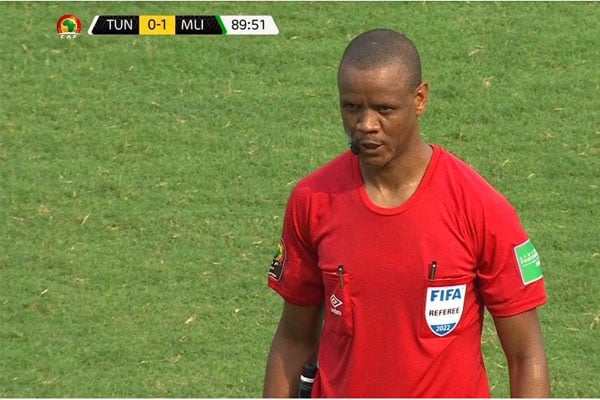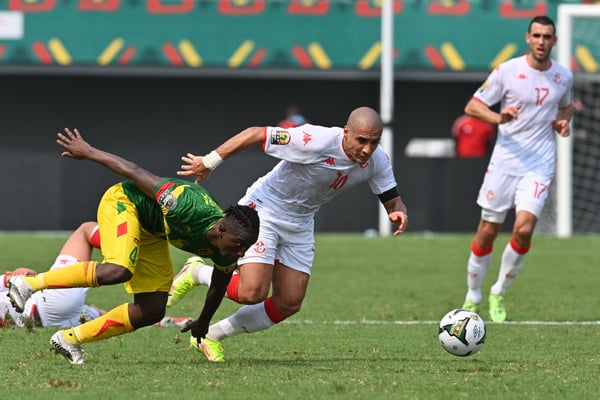Sikazwe’s heatstroke dents African football’s reputation

Zambian referee Janny-Sikazwe triggered furious reactions from the Tunisian team and its supporters after he blew the final whistle with some time left on the clock. PHOTO/SCREENGRAB/ESPN
This week’s biggest talking point in global football came from the ongoing Africa Cup of Nations (Afcon) in Cameroon.
A pretty controversial end to the Group F match between Mali and Tunisia at the Omnisport Stadium in Limbe on Wednesday has aroused debate among many football followers and lovers of the game.
Zambian referee Janny Sikazwe has been the centre of the discussion after he ended the contest prematurely, with about 17 seconds left on the clock.
First, normal proceedings
Mali won 1-0 thanks to Ibrahima Koné’s 48th minute penalty but, it is the strange incidents at the end of the match that are still fresh in memory.
“The events in Limbe were unfortunate,” said Ugandan journalist Usher Komugisha, who is covering the tournament for UK television Sky Sports.
The match had seemed to go normal in the hands of the highly ranked official. Following a dough first half, Koné struck after a handball in the area and Sikazwe later awarded Tunisia a penalty after consultation with the video assistant referees (VAR).
This time, skipper Wahbi Khazri’s effort was saved by Malian goalkeeper Ibrahim Mounkoro who punched far away to his right with 13 minutes left on the clock.
That was just before the drama began to unfold. “He was very good on both sides until the 80th minute on both sides,” remarked Tunisian football journalist Lotfi Wada who is based in Clermont Ferrand, France.
“The penalty given to Mali was absolutely fair. The one given to us was fair but he looked dizzy.” In the 85th minute, Sikazwe blew the final whistle, which he later overturned and resumed play after consultation with his assistants.
Harsh Traore send-off
Two minutes later, he sent off Malian substitute El Bilal Toure for a challenge on Dylan Bronn who had been fractionally late. But replays showed the decision had been harsh.
VAR requested Sikazwe to take a look at video replays but he declined to change his decision. That, strange again!
The epitome of the drama came when Sikazwe blew the final whistle again, at 89 minutes and 43 seconds, which got Tunisian officials and players up in arms.
As Mali’s contingent vanished into the tunnel, Tunisia’s team officials kept showing Sikazwe their watches that there was still time to play but he did not care.
It actually needed security and some Confederation of African Football (Caf) officials to escort the referee, who boasts of 15 years' experience, and his unit off the pitch, and that aroused talk all over the globe. Even those that had not watched it live chose to search about it.
Stadium clocks not working
“One thing you have to know is that for some reason, the giant screens on either end (in the stadium) are not showing the clock,” said Maher Mehazi who was at the stadium in Limbe.
He covers sport in North Africa for the BBC. “We don’t know. As journalists, we started using our stop-watches to track time,” the Algerian stated.
“And we were actually in the room for the press conference with Mali coach Mohamed Magassouba and Mounkoro when Caf officials came in and were like ‘Hey stop the press conference, you guys have to wait for the final decision’,” Mezahi narrates.
“When that happened, Magassouba said he was going back to my players. He went back to the locker-room. I heard the Caf officials say, ‘We are going to replay the match for three minutes, restart for three minutes, three minutes,’ That’s what I tweeted.”
The reaction to his tweet was fast, yielding more than 1500 retweets in a few minutes. In the meantime, Mezahi returned to the media stand, and the Malian players walked back to the pitch.
“We waited for Tunisia, they didn’t show up. Apparently, their staff were in the tunnel. The players stayed in the dressing room. I couldn’t see but that is what the photographers told me. Sikazwe waited for maybe 5-10 minutes and blew the final whistle, ending the game for the final and third time.”
Huge reputation at stake
This paper understands that Tunisian players were having a 30-minute ice bath and actually insisted on not returning to the pitch, to push Caf to replay the entire match rather than just three more minutes. But Caf maintained Sikazwe’s stance, in a statement.
“After examining the protest of Tunisia and all the match officials' reports, the Organising Committee decided the following: to dismiss the protest lodged by the Tunisian team. To homologate the match result as 1-0 in favour of Mali,” it read in brief.
Referees are usually discussed after they have made mistakes in officiating either by human error, influence such as bribery or explainable conditions which could be medical.
Sikazwe is ranked among the continent’s best referees. He officiated the final matches at the 2016 Fifa Club World Cup in Japan and at the 2017 Afcon in Gabon.
Furthermore, he officiated the Belgium versus Panama match and the Japan against Poland contest during the 2018 Fifa World Cup in Russia, the first Zambian referee in the history of the tournament.
He has such a good reputation despite a suspension by Caf in November 2018 on suspicion of corruption after he mishandled a Caf Champions League match between Esperance of Tunisia and Angolan club Primiero de Agosto. After failing to provide substantial evidence, the suspension was lifted in early 2019.
On Wednesday however, the man from Kapiri Mposhi town, which is three hours away from Zambia capital Lusaka, was a complete shadow of himself. Caf and tournament organisers whisked Sikazwe to hospital and they have since established that he suffered a heat stroke.
Terrible heat stroke
“When you think of his experience, I don't think this is a mistake that should have happened under normal circumstances,” Komugisha reacted. “Surely there was a problem!”
Heatstroke occurs when one’s body fails to control its own temperature due to prolonged exposure or physical exertion in the presence of heat.
Here, the sweating mechanism fails and the body is unable to cool down. The body temperature can rise to 106 degrees Fahrenheit or higher within 10 to 15 minutes.
During that match in Limbe, the temperatures were high at 34 degrees Centigrade and humidity at 65 percent, which largely explains Sikazwe’s dehydration debacle.
“It was a few moments that were bizarre. It happened three to four times. The first three times were normal, the fourth time, he couldn’t find the (VAR) booth. Even though it was in front of him, he ran past it. So he was acting a little bit weird. Perhaps he did have some symptoms,” adds Mezahi.
The attempt to play an extra three minutes delayed kick-off for the next Mauritania - Gambia match by 45 minutes. In the same line, Mauritania’s anthem customarily failed to play before kick-off, with players later being requested to sing it on their own.
Prior to the start of the tournament a week ago, Caf announced that it would be broadcast across the globe, in more than 150 countries, for the first time in history.
To err is human
And that’s how Sikazwe’s errors got the world talking, particularly clips trending on social media from the big channels like ESPN, beIN and Sky. However, Africa has been quick to remind the world that to err is human.
During the 2006 Fifa World Cup in Germany, top English referee Graham Poll mistakenly gave Croatian Josip Šimunić three yellow cards before sending him off against Australia.
Normally, two yellow cards equal to a send-off but Šimunić was shown a yellow card by Poll in the 61st minute after fouling Harry Kewell. And in the 90th minute, Poll, perhaps having forgotten, gave Šimunić a yellow card for another foul he didn’t send him off.
Upon the full time whistle three minutes later, an angry Šimunić pushed Poll who was triggered to show a third yellow card and then gave him the red card.
A more incident to Sikazwe happened last year when a referee blew the final whistle a minute as Sevilla faced Granada in the Spanish La Liga. Here, he added four minutes at the end but the team played just three, sparking rage from both sides.
SIKAZWE AT A GLANCE
Born: May 26, 1979
Age: 42
Place of birth: Kapiri Mposhi, Zambia
Other occupation: Teacher
Fifa Listing: 2007




